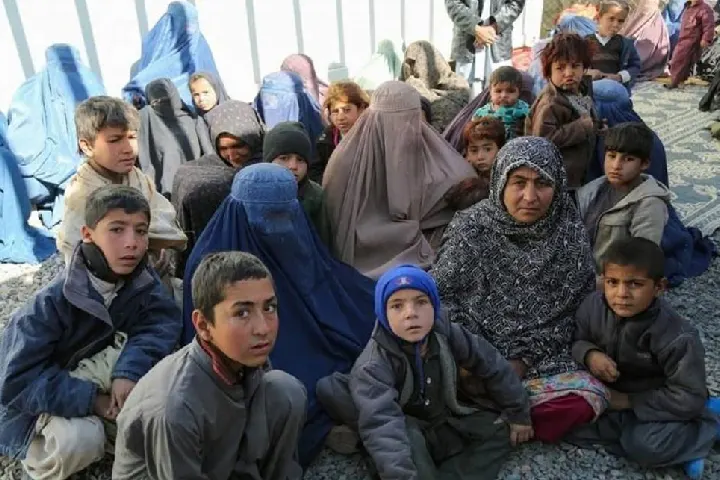

All foreigners living in Pakistan illegally have been given 28 days to leave the country or face eviction by force
Afghans are facing yet another crisis in Pakistan. Irked over Afghan Taliban’s refusal to rein in Tehreek-e-Taliban (TTP) cadres operating from Afghan soil and increasing suicide attacks in the country, Pakistan government has decided to expel more than 30 lakh Afghan refugees by November 1. Raids are being conducted all over the country to hunt and send back Afghans who are staying in Pakistan sans any valid document.
Interim Interior Minister Safaraz Bugti on Tuesday addressed a press conference and used very tough language for Afghan refugees, calling them “aliens” and those taking part in terror missions.
“There have been 24 suicide attacks since January, 14 of these 24 were carried by Afghan nationals,” Bugti told reporters. “There are no two opinions that we are attacked from within Afghanistan and Afghan nationals are involved in attacks on us,” he said. “We have evidence.”
All foreigners living in Pakistan illegally have been given 28 days to leave the country or face eviction by force, he added.
Bugti made it clear that the deadline is strict and that force will be used to evict Afghans if they don’t go back on their own volition. “If they do not go… then all the law enforcement agencies in the provinces or federal government will be utilised to deport them.”
Interior Minister made the announcement of deadline after meeting Prime Minister Anwaarul Haq Kakar and Army Chief General Asim Munir.
Meanwhile, Pakistani government agencies are conducting raids all over the country to seize Afghan properties, shut down their businesses and also immediately deporting some who they deem “doubtful” or involved in drug smuggling or supporting terror.
Ali, a journalist based in Islamabad, told India Narrative that around 800 Afghans were arrested in Islamabad and its suburbs and 375 of them were earmarked to be deported at once. He said that those refugees who don’t have any refugee status proof were being deported swiftly.
He said that the operations against Afghans are being carried out by a task force formed by the Interior Ministry.
Ali interviewed some of those refugees who were detained in Islamabad and they told him that no international organisation – be it UN or other human rights organisations – has tried to contact them.
BBC Urdu in its detailed report of ordeal of Afghan refugees quoted many of them saying that they were afraid of going out of their camps even for buying vegetables as they might be arrested. The report says that there is widespread panic among the impoverished Afghans who largely work as labourers in various jobs.
The consulate of the Islamic Emirate in Karachi, Abdul Jabar Takhari, said that more than 900 Afghan refugees have been detained in Pakistan within the past two weeks.
“A lot of Afghans have been detained. Their number is around 900. Many of them are the Afghans who have legal documents… we were able to facilitate the release of 200 Afghans who had legal documents,” he said.
The Islamic Emirate of Afghanistan’s spokesman, Zabiullah Mujahid, in an interview with Khama Press, said that the refugees should be treated in accordance with the laws.
“We request that the refugees should be treated well and according to the laws, humanity, and Islamic manners. They should not be harassed and taken to prison. If they don’t have the documents, they should be returned to the country peacefully,” he said.
But new measures of Pakistani government seem to have made it clear that “business as usual” won’t continue with Taliban-ruled Afghanistan.
‘One Document Regime’ for Afghans
Another major decision approved by the apex committee was to introduce the “one document regime” for Afghans travelling to Pakistan. In the first phase, starting from October 10, Afghans with e-Tazkirah would be allowed to travel while manual documents would not be entertained.
However, from the next month Afghans, wishing to travel to Pakistan, would need valid visas. “All other documents that were earlier admissible would not be valid for travel use.”
The move will impact thousands of Afghans who use Tazkirah to shuttle between the two countries.
Stats and Status of Afghans
According to a report by the United Nations High Commissioner for Refugees (UNHCR), the population of Afghan nationals residing in Pakistan has surged to 3.7 million as of June this year, with a mere 1.3 million of them officially registered with the authorities.
Approximately 775,000 unregistered Afghans are currently residing in the country, according to ARY News.
As per the Pakistan media outlet a major 68.8 percent of Afghan citizens in Pakistan have settled in urban or semi-urban areas, while the remaining 31.2 percent are disturbed across 54 different regions including villages.
Afghans have poured into Pakistan in their millions during decades of successive wars, many living in refugee camps with restricted access to education, healthcare and employment. An estimated 600,000 have arrived since the Taliban seized power in Kabul in August 2021. Many are seeking asylum in third countries.
Pakistan launched crackdowns on Afghans in the past and threatened to deport them all, but the campaigns fizzled out after a few months, or following talks between Islamabad and Kabul.
As India continues to get World support against the Pahalgam Terror attack that killed 26…
Union Minister of Industry and Supply Piyush Goyal on Saturday highlighted the success of a…
In a display of outrage following the Pahalgam terror attack, thousands from the Indian community…
In a continued crackdown following the Pahalgam terror attack, security forces and Jammu and Kashmir…
In a massive statewide crackdown, over 550 illegal immigrants from Bangladesh were detained in Ahmedabad…
The Deputy Chief of the Main Operations Directorate of the General Staff of the Russian…